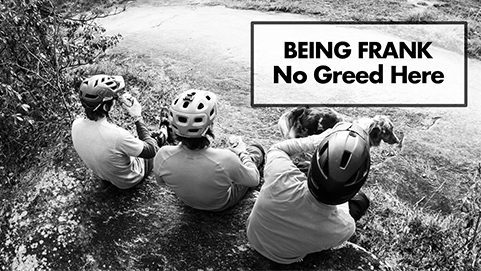

If it was not so inaccurate and frequent, it probably would not bother me so much. But seemingly a week cannot go by without someone commenting how a “greedy bicycle company” did this or that. As I write this it dawns on me how hilariously off-the-mark such comments are. Actually, it can be argued that the bicycle industry would be in a healthier place if companies were better equipped at running profitable businesses. But the reality is most, and I mean nearly all, bicycle businesses were started as a labor of love versus a means to increasing shareholder wealth. Hence the popular bicycle industry saying: To make a small fortune in the bike business, start first with a BIG fortune.
So why get irked by inaccurate labeling? Oh my, I just hit one of my own hot buttons: labeling. Everyone I have ever met, whether I liked them or not, has had a complex personality. Attempting to distill that complexity into a few labels is more than a disservice, it’s criminal in my opinion. Fred is more than just a Democrat, a roadie, or a tree-hugger. The group of people that form a company is even more complex. Therefore a label such as “greedy” falls even further from what they are about. But I digress.
Over the years I’ve had the opportunity to work with or at least meet many of the leaders in the bicycle industry. And while their agendas and motives varied, none of them, with one exception, indicated or demonstrated that greed was a driver. Some just want everyone to enjoy bicycles as they do, some want to save the world with bicycles, and some want to win with the best bicycle products. Certainly there are many decisions and strategies related to how they run their business that I disagree with, but in no case have I witnessed the bicycle being used as a tool for greed.
One has to look no further than the parking lots of bicycle companies for evidence of lack of greed. They are full of WRXs, GTIs, Elements, 4-Runners, Miatas, and other fun/active-lifestyle models that are at least 3-5 years old – not new BMWs, Jags, and Porsches. One bicycle company president I worked for drove a Camry, another a well-worn Audi S4 Avant, and a VP I reported to a Ford Explorer. Don’t get me wrong, there are some car guys in the business. But they usually have toiled for years for that old 911, and the rest of their “collection” is a mini van for family duties, a 6-year old F-150 for a daily driver, and a clapped out Civic with a fart can for the teenager.
And then there is the knowledge of what things cost: tooling for a fork casting or a frame mold, the FOB cost of an injection molded brake hood or an extruded seat clamp, and the duty and freight to get it from there to here. Add to that the costs of doing business – salaries, advertising, insurance, rent, etc. – the margins everyone in the supply chain requires to stay alive, and it is easy to see when things don’t seem to add up. Like the unbelievable amounts the late 90’s Schwinn/GT group was spending. They had to have had a secret to making a lot more money than the rest of us… or they were living on borrowed time (and money). History clearly shows it was the latter.
Yes, we all strive to be profitable. However, profit and greed are two very different things. In Cane Creek’s case, being profitable ensures that we can reward our employees for their great efforts, invest in the company to ensure we are around for many years to come, spend on research and development of new product ideas, support and promote cycling in our own backyard, and be as prepared as possible in today’s uncertain world. My experience and knowledge tell me that’s the same situation for every other bicycle company. While we are all far from perfect, and you’re likely to have had an experience or two to make you question a company’s motives, I can assure you that most everyone in this business is here for the right reasons, and they are not getting rich.
Monday: 10:00 am – 5:00 pm
Tuesday – Thursday: 10:00 am – 5:00 pm
Friday: 10:00 am – 5:00 pm
Saturday – Sunday: Closed